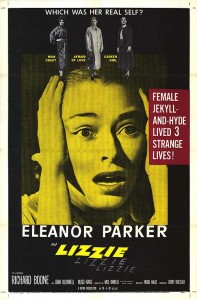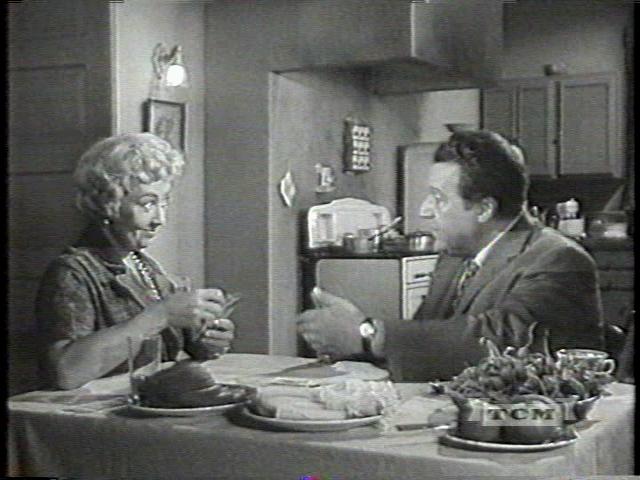Lizzie (1957)
“Sometimes at night I can’t sleep. I get up and I go to the mirror, and I stare at myself. Something strange seems to happen — it’s as though somebody else is staring back at me.”
|
Synopsis: |
|
Genres, Themes, Actors, and Directors:
Review: These days, especially after the airing of Sybil (1976) on television, Multiple Personality Disorder (MPD) is much more widely known by the general public, and no longer quite so mysterious. Indeed, its name has changed — it’s currently referred to as Dissociative Identity Disorder (DID) — and there is ongoing controversy over the veracity of its diagnosis. Nonetheless, MPD/DID remains ripe material for cinematic exploitation, given that there’s something undeniably fascinating — indeed, horrifying — about witnessing someone who is literally possessed by a “foreign” entity. While Lizzie isn’t a perfect film — things are wrapped up far too neatly in the end — it remains a compelling and scary little drama, well-worth watching at least once. Note: Shirley Jackson — author of “The Lottery” and The Haunting of Hill House — wrote the novel upon which Lizzie is based, originally entitled The Bird’s Nest. Redeeming Qualities and Moments:
Must See? Categories
Links: |


2 thoughts on “Lizzie (1957)”
Very much a must (and not just because it’s a personal fave). Yes, as a document on mental disorder, it’s more than somewhat cursory. But looks into this area are critical and here the subject is treated with respect. Director Haas manages to keep delicate material from sliding into camp, and for that he mostly has Eleanor Parker to thank. Of course, it could be easy to laugh–esp. during the first change we see from “Elizabeth’ to “Lizzie’ (well, and when aunt Blondell is taking out the “garbage’ that consists of only liquor bottles), but it really is hard seeing this as camp when we come to care for Parker easily early on. It’s an arresting, affecting performance.
Note: Apparently this is the only feature film Johnny Mathis appeared in (as, what else?, a piano man).
Yes, one person’s comment on IMDb referred to this film as high camp, and I must say I couldn’t see it — it’s much too honest, and too naturally acted. (Even the psychologist — despite his rather cliched lines at times — doesn’t deliver them in that classic, stodgy “I am the authority here” voice used by so many doctors in ’50s flicks). Blondell’s aunt edges into stereotypical “sot” humor at times, but still, not camp — and her neighborly interactions with Hugo Haas’s do-gooding character help to ground the film. Parker, as you mention, is a wonder to behold… I was truly frightened for her on her own behalf.